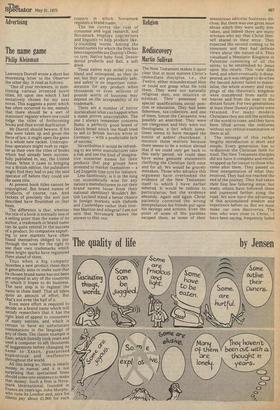Advertising
The name game
Philip Kleinman
Lawrence Durrell wrote a short but interesting letter to the Observer the other day. It read as follows: "One of your reviewers, in mentioning various invented novel titles, hit upon one which I had tentatively chosen for my next novel. This suggests a point which has often occurred to me, namely that there should be a sort of stationers' register where one could lodge the titles of forthcoming books and thus avoid duplication.'
Mr Durrell should beware. If his idea were taken up and given the force of law, it might open the gates to a whole new racket. Unscrupulous operators might rush to register as their own the titles of books which had already been successfully published in, say, the United States. When it came to bringing out a British edition, the publishers might find they had to pay the said operator off before they could use the same title.
At present book titles cannot be copyrighted. But brand names of Products, of course, can. And rackets of precisely the sort just described have flourished on that. basis.
The difference is that, whereas the title of a book is normally less of a selling point than the name of its author, a trademark or brand name can be quite central to the success of a product. So companies exporting to new markets have often found themselves obliged to pay through the nose for the right to use their own trademarks which some bright sparks have registered there ahead of them.
Thus when a big company launches a new product these days it generally aims to make sure that its chosen brand name has not been Pre-empted in any of the countries in which it hopes to do business. The next step is to register the name in them itself. That all takes quite an amount of effort. But that's not even the half of it.
Even more effort is required to decide on a brand name which will satisfy researchers that it has the, right kind of appeal to consumers of many nations, and which is certain to have no unfortunate connotations in the language of any of them. The classic example is Esso, which literally took years and used a computer to sift thousands of suggestions before changing its name to Exxon, guaranteed euphonious and inoffensive throughout the world. All this being so, there is clearly money in names, and it is not surprising that specialised firms Should come into existence to make that money. Such a firm is Novamark International, founded in France six years ago. John Murphy, Who runs its London end, says his Clients pay about £1,000 for each country in which Novamark registers a brand name.
The fee covers the cost of consumer and legal research, and Novamark employs copywriters and linguists to help produce likely-sounding words. Among the brand names for which the firm has been responsible are Dunlop's Denovo tyre, Nativa baby food, Dexter dental products and Bali, a soft drink.
These names may strike you as bland and uninspired, as they do me, but they are presumably safe, and safety is an important consideration for any product when thousands or even millions of pounds worth of business may depend on the acceptability of its trademark.
There are a number of horror stories about what can happen when a name proves unacceptable. The one I always remember concerns Bums, a perfectly good brand of Dutch bread which the Naafi tried to sell to British Service wives in Germany — with a predictable lack of success.
Nevertheless it would be refreshing to see some manufacturer take a risk and use the kind of imaginative nonsense names for their products that pop groups have invented to market themselves — a Led Zeppelin type tyre for instance. Less facetiously, is it in the long run economically wise for any nation's manufacturers to cut their brand names loose from their national identities? Wouldn't British Leyland stand a better chance in foreign markets with Oxfords and Cambridges rather than rootless Marinas and Allegros? I am not sure that Novamark knows the answer to that one.


























 Previous page
Previous page